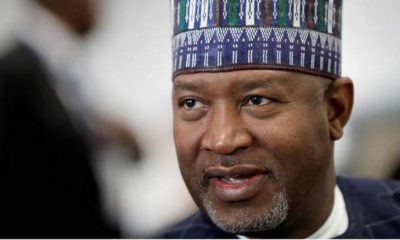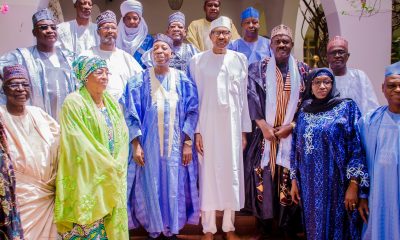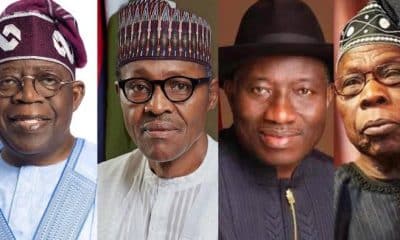Nigeria News
President Buhari Speaks On Why He Rejected Bills Passed By The National Assembly

President Muhammadu Buhari has written to the Senate to explain why he declined assent to 14 bills after it was sent to him for assent.
Naija News learnt that the President’s explanation was contained in letters read by the Senate President, Bukola Saraki, on Tuesday.
https://twitter.com/diamondnewsngr/status/1049939111962914816
The president also introduced Suppression of Piracy and Other Maritime Offences Bill, 2018 to the upper chamber; he requested that the bill be considered and passed into law. He explained that the bill is intended to curtail illegal activities of pirates at sea as well as to reduce the incidences of theft in domestic and international waters.
I think the president is right this time. I wonder if this our lawmakers personally study these bills before passing them into law or they just approve everything from the committees without proper scrutiny. there is really need to work on our… https://t.co/0fhOiXe2aX
— Ozoemena Nwodo (@ozolity) October 10, 2018
He also said the bill, (if passed) will domesticate the relevant provisions of international treaties to which Nigeria is a signatory, such as Provisions of the United Nations Convention on the Law of the Sea, 1982 (UNCLOS II) relating to piracy; as well as the Convention for the Suppression of Unlawful Acts (SUA) against the Safety of Maritime Navigation, 1988 and its protocols.
The president gave reasons for his refusal to sign the other bills.
Here are his reasons for rejecting some of the bills:
- National Research and Innovation Council (Est.) Bill, 2017: For this bill, the president said the requirement for 5 per cent of the annual allocation of 14 entities listed in section 17 of the Bill to be paid into the Research and Innovation Fund is unwieldy and may be practically difficult to implement in some instances. For example, he said, the Tertiary Education Trust Fund does not receive any federal allocation.
He said the requirement that 1 per cent of the National Gross Domestic Product (GDP) be sourced from the federal government be paid into the Research and Innovation Fund is also practically unworkable as the GDP is an economic measure at the market value of all the final goods and services produced in a period of time; it is not cash or revenue accruable to the federal government.
Mr Buhari also noted incorrect references to some of the entities specified in Section 17 of the Bill. For instance, the Information Technology and Development Fund should be the National Information Technology Development Fund.
- National Institute of Hospitality and Tourism (Est.) Bill, 2018: Mr Buhari said his decision to decline assent to this bill was because there was no compelling reason for the requirement in Section 5(3)(k) that 25 per cent of the revenue generated for the federal government should be used directly by the institute.
“The retention of such a high amount is to the determinant of the revenue, available for funding the budget of the Federal Government and is for in excess of what the Federal Inland Revenue and the Nigeria Customs Service are able to retain which is 4 per cent and 7 per cent respectively; and
“A number of provisions in the First Schedule to the Bill in respect of the Supplementary Provisions relating to the Board are not in accordance with good practice in corporate governance,” he said.
- National Agricultural Seeds Council Bill, 2018: The president declined assent to this bill because there already exists a National Crop Varieties and Livestock Breed (Registration, Etc) Act which covers some of the proposed functions of the National Agriculture Seed Council Bill.
He said the passage of this bill into law would create confusion as to the proper authority to regulate crop varieties in Nigeria.
- Subsidiary Legislation (Legislative Scrutiny) Bill, 2018: Mr Buhari declined this bill because he is concerned that the bill will slow down the administrative processes for implementing agencies.
He also said the bill does not leave room for administrative discretion borne out from administrative experiences that would enable sectors work faster in handling or addressing urgent matters.
The president added that the bill may also impede the federal government’s drive for increased revenue collection since an implementing agency that drives revenue from licenses will now have to go through a legislative process every time it intends to update its administrative process of increased license fees.
- Stamp Duties (Amendment) Bill, 2018: For this bill, Mr Buhari said revenues from stamp duties are currently shared among all three tiers of government. Accordingly, transferring collection responsibilities from the Federal and States’ Inland Revenue Services to Nigerian Postal Services may deprive the States and Local Governments of their share of stamp duties revenues.
He also said the bill’s proposals for the imposition of stamp duties on savings accounts and electronic transactions may impair the implementation of the federal government’s Financial Inclusion Strategy, e-payment programmes and cashless banking policies.
- Chartered Institute of Entrepreneurship (Est.) Bill, 2018: The president said this bill is unnecessary in view of the fact that potential entrepreneurs have various existing options to hone their skills such as universities which currently offer entrepreneurship as a course of study.
He also said the creation of the institute by legislation is not coextensive or coterminous with capacity development and the proposed bill may contain citizen’s right freedom of action.
- Industrial Development (Income Tax Relief) (Amendment) Bill, 2018: For this bill, Mr Buhari declined to enable ongoing consultations by the Ministry of Industry, Trade and Investment with relevant Ministries, Departments and Agencies (MDAs) on the tax holidays incentive, resume Expansion Project Investments in rural areas as well as for agriculture agro-processing to be concluded.
“It is my expectations that these consultations would result in fiscal measures that would greatly enrich the quality of the tax holidays incentive regimes for these types of projects and investments. We also expect that these fiscal measures, once finalised, would be subsequently submitted to the National Assembly by way of Presidential Executive Orders of executive bills for consideration and passage into law by the federal legislature,” he said.
- Advance Fee Fraud and Other Related Offences (Amendment) Bill, 2017:
“I am declining assent to this bill which would reduce the minimum punishment for the offences under the Advance Fee Fraud and Other Related Offences Act due to the prevalence of the offences, the need to detect the offences and the need to adequately punish offenders.
“I am also concerned that the amendment to the Principal Act have watered down the sentences by giving the courts too much discretion in respect of the minimum sentences,” the president explained.
- Nigerian Maritime Administration and Safety Agency (Amendment) Bill, 2017: The president refused to sign this bill because the amendment will create ‘distortions’ to the operationalisation of the NIMASA Act.
Mr Buhari urged the Senate to focus on passing the Suppression of Piracy and Other Maritime Offences Bill, 2018 – in order to achieve a more comprehensive review of the operations in the maritime sector.
During the break, the president had rejected the Electoral Act Amendment Bill and five constitutional amendment bills.












